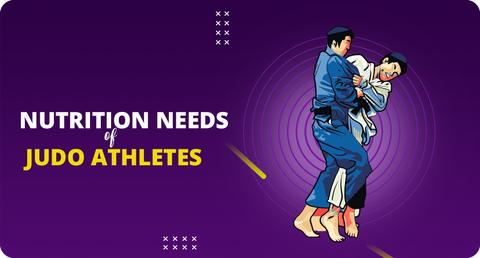Judo falls under the combat sports discipline. It is a weight class sport indicating that individuals compete under different weight categories. It is an intense physical and mental game.
It involves high-intensity training and since it is not a seasonal sport, hence most elite players are expected to compete for at least 15 times a year. A judo fight lasts for approx. 5-10 minutes.
Nutrition plays a huge role in determining the performance of judo players. Judo has more elements of anaerobic activity as compared to aerobic and the body tends to switch between the two depending upon the needs.
Therefore, adequate nutrition is a must for judokas. It helps in reducing both physical and mental stress, prevents or minimises lactic acid accumulation, helps reduce muscle soreness and speed up recovery rate.
Out of all macronutrients, carbohydrates are required in higher quantities. Although the amount and type may vary depending upon the timing, duration and intensity of training. Carbohydrates are the prime source of energy for judo players which help them in performing for a longer duration, training properly with minimal depletion of their glycogen stores. Overall carbohydrates requirement ranges between 4-5 g per kg body weight per day. Complex carbohydrates should form the major chunk of the diet as they help in the sustained release of energy. Therefore, food options like whole grains muesli, multi-grain chapatis, bread, wheat pasta, quinoa, oats should be preferred. But judokas can switch to high glycemic index foods having simple carbs 30-60 minutes prior to competition. This will help in providing instant energy without causing any load on the stomach. It aids in boosting up energy levels ensuring a quick supply. For example, fruits, jellies, jam with white bread, energy gels, MCT oil are some of the rapid digesting foods.
Carbohydrates are required at every stage of the competition. Post judo match, carbohydrate intake is advisable to regain lost energy levels and glycogen stores. The requirement may vary between 30-50 grams depending upon the session intensity.
Another critical area is maintaining the hydration levels of the body. Proper hydration is critical for optimal performance, maintaining a fluid-electrolyte balance of the body, preventing muscle cramps and flushing out toxins from the body. Dehydration can reduce athletic performance, increasing the accumulation of fat and muscle loss. Sports energy drinks like Snergy are a perfect way to stay hydrated and meet increased carbohydrate needs. Snergy contains a balanced ratio of carbohydrates and electrolytes which assist in keeping the energy levels up, no matter how gruelling the training or competition is.
Judokas should also ensure to maintain adequate protein intake. It is a critical nutrient and sometimes overlooked. But protein needs are high for muscle repair and recovery. Poor muscle health can reduce performance, increase injury risk, cause muscle damage and soreness. Judokas should aim to consume at least 1.6-1.8 g protein per kg body weight per day to gain muscle strength and maintain lean mass. Post judo session, it is important to combine carbohydrate with a minimum of 15-20 grams of protein for appropriate recovery. Check Steadfast's best whey protein range.
In order to take care of their cartilage, joints, ligaments and tendons, judo players should aim to keep their collagen levels healthy. Collagen helps in keeping the cartilage strong and reduces injuries (Buy Collagen). Protein-rich and vitamin C rich foods are critical to maintaining collagen levels in the body. Else, opting for a supplement like Collastead is also a safe and reliable alternative.
In addition to carbohydrates and proteins, judo players must include foods in the diet rich in good fats, vitamins and minerals. Lack of adequate fat may affect the absorption of fat-soluble vitamins like A, D, E and K leading to deficiency disorders. Judokas should choose good fats like omega 3 fats, fatty fish, fish oil supplements, olives, olives oil, walnuts, seeds and avocados. Vitamins and minerals are essential for energy metabolism, prevent deficiencies, reduce inflammation, fight oxidative stress and boost immunity. Minerals like sodium, potassium, iron, magnesium, calcium, phosphorus and zinc help in maintaining bone density, electrolyte balance and improves muscle contraction.
To sum up, the diet should be adequately rich in proportion to nutrients. Carbohydrates rich foods are suggested for judo players along with the required amount of proteins, good fats, vitamins and minerals. In order to meet the needs, judokas can also choose supplements like Power Active which offers a blend of all and are easy to incorporate into the diet.
REFERENCES
Judo, B. (2016, July 11). Fuelling the Body for Judo. British Judo. https://www.britishjudo.org.uk/fuelling-the-body-for-judo/
Zagrodna (Kopeć), Aleksandra & Książek, Anna & Lisowska, Małgorzata. (2014). An assessment of diet among high – rank professional judo athletes. Journal of combat sports and martial arts. 5. 37-41. 10.5604/20815735.1127452.
Martinez-Rodriguez A, Vicente-Salar N, Montero-Carretero C et al. Nutritional strategies to reach the weight category in judo and karate athletes. Arch Budo 2015; 11: 381-391
http://burnabyjudoclub.ca/documents/performance-nutrition-for-judo.pdf
http://www.universityofjudo.com/wp-content/uploads/2012/10/Sports-nutrition-for-judo.pdf

